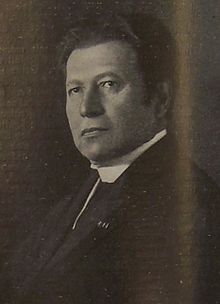Siegwart Friedmann
Siegwart Friedmann , actually Samuel Friedmann (born April 25, 1842 in Budapest , Kingdom of Hungary , † April 22, 1916 in Dresden , German Empire ) was an Austrian actor . He is considered one of the most important character actors of the second half of the 19th century and ushered in a new heyday of the art of acting in Germany with the establishment of the Deutsches Theater in Berlin .
Life
Siegwart Friedmann was the son of the businessman Heinrich Friedmann and his wife Johanna. He and his brother, the future entrepreneur Alexander Friedmann, grew up in modest circumstances. Intended by his father for the commercial profession, he came to Vienna at the age of 14 to start the trade.
His inclination for the stage developed during his apprenticeship. Bogumil Dawison recognized his talent and had him trained in his own home. Dawison took on the dramatic part of the lesson himself. In 1863 Friedmann made his debut at the City Theater in Breslau . A year later he was engaged at the Königliche Schauspielhaus Berlin , where he played for seven years alongside Theodor Döring and Ludwig Dessoir in the character field. He then moved to the Schwerin court theater in 1871 , and from 1872 onwards he enjoyed great success under Heinrich Laube at the Burgtheater in Vienna . Laube appointed him his director and gave him the professorship for acting at the Vienna Music Academy . After breaking with Laube, Bernhard Pollini won it for Hamburg in 1876. In 1879 Friedmann returned to the Stadttheater in Vienna and in 1880 took part in the entire Viennese guest performances, which made him known throughout Germany, Austria and Russia . Since then Friedmann had thought of founding a stage in Germany based on the model of the Théâtre-Français in Paris , which would bring together the best German-speaking actors. On September 29, 1883 he was able to open the German Theater in Berlin with Schiller's Kabale und Liebe .
From 1868 to 1873 Friedmann was married to Helene von Dönniges . His marriage to Selma Giebel (1850-1892), which arose from the Westerholt-Gysenberg family , was unhappy. Friedmann died in Dresden in 1916 and was buried in the Tolkewitz urn grove .
roll
Friedmann initially played bon vivants , but quickly switched to the character subject, where he developed an enormous range. His roles ranged from the classic villain to salon intrigues. His real domain, however, were the highly tragic roles and minded people. His repertoire included roles such as Richard IV, Hamlet, Shylock, Othello and Iago, Alba, Philipp, Franz Moor, Marinelli, King's Lieutenant, as well as Bonjour, Rocheferrier, Schumrich, Bolz and others.
literature
- Rudolf von Gottschall: A pupil of Dawison's , in: Die Gartenlaube. Illustrated family sheet. Born in 1879. Ernst Keil, Leipzig 1879, pp. 564–567. With portrait (as Hamlet), wood engraving after a photograph by Adolf Neumann.
- Ludwig Eisenberg : Large biographical lexicon of the German stage in the XIX. Century . Verlag von Paul List , Leipzig 1903, p. 287 ff., ( Textarchiv - Internet Archive )
- Friedmann, Siegwart (1842–1916), actor. In: Austrian Biographical Lexicon 1815–1950 (ÖBL). Volume 1, Publishing House of the Austrian Academy of Sciences, Vienna 1957, p. 365 f. (Direct links on p. 365 , p. 366 ).
Individual evidence
| personal data | |
|---|---|
| SURNAME | Friedmann, Siegwart |
| ALTERNATIVE NAMES | Friedmann, Samuel (real name) |
| BRIEF DESCRIPTION | Austrian actor |
| DATE OF BIRTH | April 25, 1842 |
| PLACE OF BIRTH | Budapest , Kingdom of Hungary |
| DATE OF DEATH | April 22, 1916 |
| Place of death | Dresden , German Empire |

